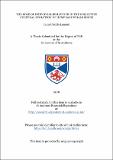The role of individual behaviour in the collective cultural evolution of humpback whale songs
Abstract
For more than forty years, the complex songs emitted by humpback whales have
fascinated the scientific community as well as the general public. These songs are
produced by males during the breeding season, and are hierarchically structured and
population specific. Within a population, males tend to conform to the same song type,
but songs undergo gradual unidirectional change. Instances of more rapid song changes
have also been recorded, where the song sung by a population has been replaced by the
song of an adjacent population. The learning mechanisms that concurrently drive song
conformity, and simultaneously allow gradual (evolution) and rapid (revolution) song
change are not currently understood. This thesis aims to address this gap by using
innovative theoretical models as well as more established empirical methods.
Chapter 1 provides a general introduction to the thesis topics. In chapter 2 I
introduce a spatially explicit agent-based modelling approach to investigate humpback
whale song evolution and transmission. I found that shared feeding grounds promote
inter-population song transmission, song conformity emerges as a function of breeding
ground geographical segregation, and production errors facilitate gradual evolution of
songs. In chapter 3, the same modelling approach is extended to simulate song
revolutions using a new learning bias in combination with different movement
scenarios. I found that the consistent emergence of song revolutions is dependent on
cognitive (song memory), behavioural (singing probability) and spatial (agent density)
factors. Finally, in chapter 4, I analyse intra- and inter- individual song variability at
different hierarchical levels of organisation in songs recorded off eastern Australia. I
found that variability is not homogeneously distributed across the different song levels.
Furthermore, I identified consistent and distinctive individual patterns of song
production consistent with the theory that songs could represent mate quality
advertisements for females.
Type
Thesis, PhD Doctor of Philosophy
Items in the St Andrews Research Repository are protected by copyright, with all rights reserved, unless otherwise indicated.

